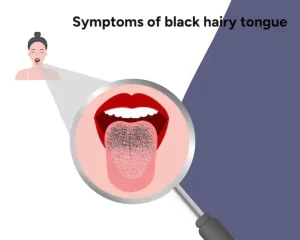Overview
Diagnosis of Black Hairy Tongue
Black hairy tongue is diagnosed primarily by examining the appearance of your tongue and considering risk factors. Your healthcare professional may also check for other conditions that can cause a similar appearance, including:
-
Normal variations in tongue color.
-
Foods or medications that can stain the tongue.
-
Fungal or viral infections.
-
Patches on the tongue, such as oral hairy leukoplakia.
-
Pseudo-black hairy tongue, which can occur from products containing bismuth, like Pepto-Bismol.
A thorough evaluation ensures that the discoloration is indeed black hairy tongue and not another oral condition.
Treatment for Black Hairy Tongue
In most cases, black hairy tongue is harmless and does not require medical treatment. Although the condition may look unusual, it is usually temporary.
Self-care and lifestyle adjustments can help resolve the condition:
-
Good oral hygiene: Brush your tongue gently whenever you brush your teeth to remove dead cells, bacteria, and food particles. Use a soft-bristled toothbrush or a flexible tongue scraper.
-
Stop contributing factors: Avoid tobacco and irritating mouthwashes that may worsen the condition. Consult your healthcare professional before stopping any prescription medications.
-
Quit smoking: Consider smoking cessation programs to support long-term oral health.
Lifestyle and Home Remedies
Maintaining a healthy mouth and tongue is key:
-
Brush after eating: Brush your teeth at least twice a day, ideally after meals, using fluoride toothpaste.
-
Floss daily: Flossing removes trapped food and plaque between teeth.
-
Regular dental visits: Professional teeth cleanings and oral exams help prevent problems and allow early detection.
-
Balanced diet and hydration: Eat fresh fruits and vegetables, and drink plenty of water to maintain oral health.
Preparing for Your Appointment
To make the most of your healthcare visit, prepare in advance:
What you can do before your appointment:
-
Make a list of all symptoms, including minor or unrelated ones.
-
List all medications, supplements, and vitamins you take, including doses.
-
Prepare questions to ask your healthcare professional or dentist.
Questions to consider:
-
What is causing my symptoms?
-
What is the best treatment plan?
-
Are there habits I should change to improve this condition?
-
How often should I follow up?
What to Expect from Your Healthcare Professional
During your appointment, your healthcare professional or dentist may ask:
-
When did you first notice the symptoms?
-
Are the symptoms constant or intermittent?
-
How often do you brush your teeth or clean your dentures?
-
How often do you floss and use mouthwash?
-
Do you consume coffee or tea regularly?
-
Do you use tobacco products?
-
What medications, herbal products, or supplements do you take?
-
Do you breathe through your mouth?
-
Have you had any recent infections or illnesses?
Being prepared with this information helps your provider make an accurate diagnosis and develop the best treatment plan.
Advertisement

